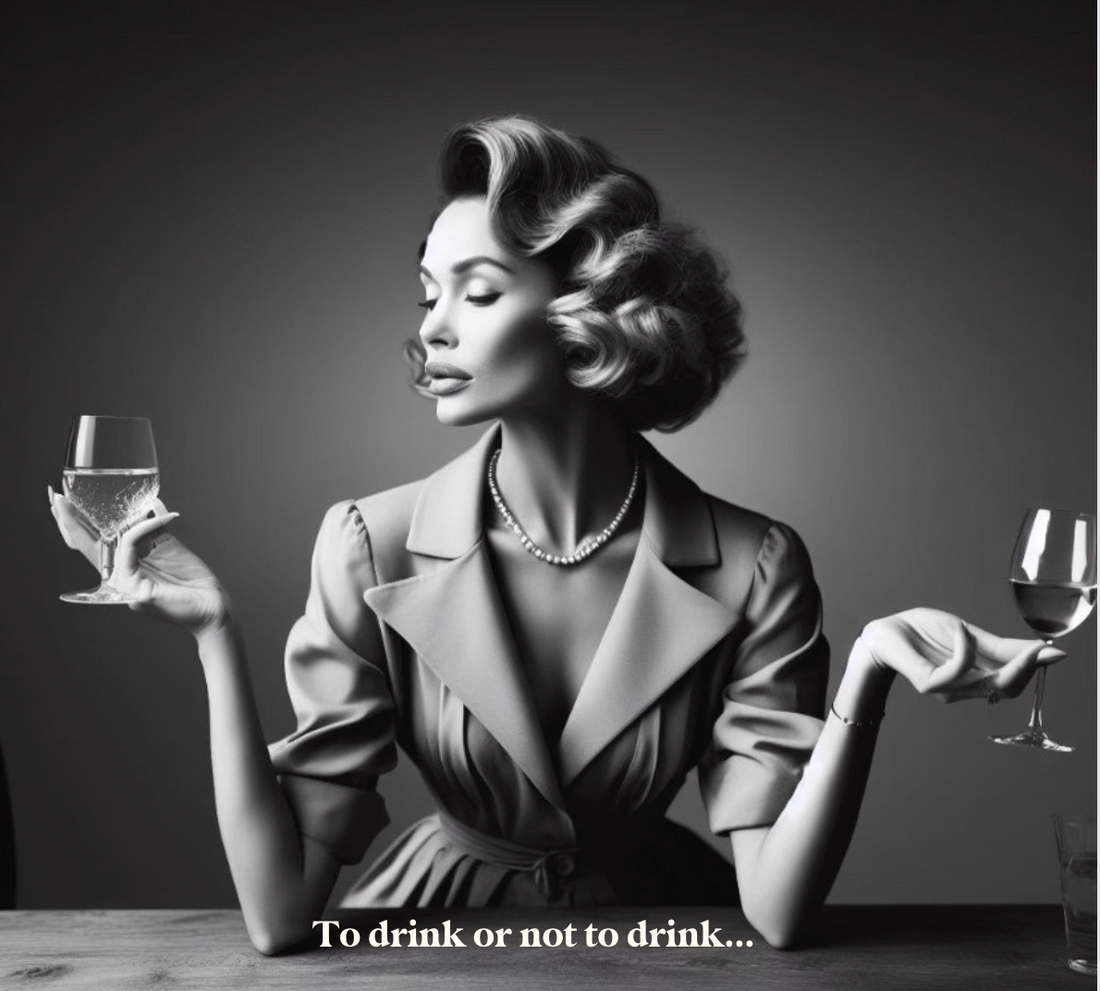
The stigma around sobriety
Share
Last week I talked about ‘going dry’. It seems to have touched a nerve in a much-needed way. My post raised a lot of questions and concerns, and I haven’t stopped thinking about it since the comments started rolling in.
Sarah Kate, founder of Some Good Clean Fun and Mocktologist says she doesn’t like the word ‘sober’, or ‘sobriety’ and I couldn’t agree more. For starters, ‘sober’ feels indicative of a problem or issue that requires us to stop all together and seek help. Sober has become stigmatic.
The issue with stigmatic topics like alcoholism and sobriety (and menopause) is that they create a vulnerability within us. The problem with being vulnerable is that not all of us are willing to open ourselves up to judgment and criticism.
Church basements
In the past the topic of alcoholism and sobriety conjure up images of depressing church basements, a group of troubled people with big issues and a hush around the topic outside of group meetings. I’m happy to report that treatment has come a long way, but it still has a long way to go to remove that stigma. And who is partially to blame? We are. When I think of ‘sobriety’, I think of putting my issues out on display in front of a group of strangers who applaud me for taking the first step. Right there I don’t identify. I have control of this. Or do I? It’s time for introspection.
Silencing instead of supporting
Whether it’s for now or for good, deciding this is often easier with the support of friends and family. However, supporting someone can be tricky and often we can say and do things that can come across as just the opposite.
Unsupportive technique #1
Quite a few of the comments I received talked about how women felt that they were shamed when they talked about going dry. It appears by making a healthy choice for their lifestyle, they were treated as if they had a problem and needed to remove alcohol from their lives to fix it. Their decision was met with judgement, not support.
Unsupportive technique #2
On the other side of that, some found that their friends pressured them in to ‘just one’ when they went out. Likely because we feel judged by those who aren’t drinking. I get that. Alcohol lowers our inhibitions and who wants the friend there to remember every bad decision from that night? (note: if this is the case, perhaps it’s time to question our intake and do some quantity control!). Instead of respecting and supporting their decision, they were being challenged to break it. If these are our friends, I think we need to rethink friendships.
Unsupportive technique #3
Hey Judgy Pants!
No judging! Louder for those at the back. Observing and keeping track of someone’s cocktail intake is not supportive, it is judgemental. Making an open observation about their drinking, especially in front of others is not supportive, it is judgmental.
“You are not the judge of me.”
As I explored my first week of no alcohol, I loved it. I felt fresh and clear headed. I slept well after a few nights. I had no regrets. On the weekend I had two very special events that I have been looking forward to for months. I had wine both nights. I enjoyed it, I drank in moderation, and I didn’t feel bad about it. I got a few jabs from some people but I’m comfortable in my decision, so those jabs don’t bother me. (Note: see unsupportive technique #3 above.)
The stories I have experienced first-hand and through feedback from this amazing community have really exposed all sides of this coin. There are those who have no interest in going dry. They have it under control. They don’t feel they have a bad relationship with alcohol. I applaude that.
“You are your own liquor control board"
- My dad
There are those who have said they don’t have a problem unless they are around other people. They claim certain groups of people ‘make’ them drink. We must seriously reposition that and take a good look at ourselves if that’s the case. As my dad says – we are our own liquor control board. If we choose to drink, it is a decision we make for ourselves. No one else can make that decision for us. Unless they have a firearm, they cannot physically force us to drink either. And if they have a firearm, I highly recommend you take away their alcohol!
Now is a good time for some introspection if you feel easily influenced by others. My personal experience with this is that if I feel that vulnerable around other people, it is usually a weakness in me that I am concerned about.
All or nothing?
That’s a great question. It’s also a very personal question and the response is up to us and no one else. Of course, if someone has an unhealthy relationship and/or tolerance with alcohol then it is likely a ‘or nothing’ case. However, if we start to look at drinking through a new lens, we can begin to look at the real issues around how it impacts our health and well-being. As with anything, moderation is key.
There are some (including me) who are giving this serious thought. The thought of never having a glass of wine again can be overwhelming and if that’s the case with you (it is with me) – I highly recommend checking out Some Good Clean Fun for great tips and recipes to help. I went into this thinking I would give it up all together but as I have more conversations around this, I realize I would like to enjoy a glass of wine. For me, I’m going to focus on alcohol free unless it’s an occasion or maybe to treat myself on a weekend night. Who knows where that will lead. Will it slowly become less and less appealing to me? Or will it be that I strike a healthy balance?
Balancing act
Post-Covid we have all discovered the absolute necessity for balance. This can be applied to almost anything – exercise, diet, nutrition, sex, and many other areas of our lives. The key here is to figure out why we’re drinking and are we relying on alcohol to create our enjoyment or enjoying ourselves with a glass of wine as a bonus? This might sound simple, but it is a critical point when determining if alcohol is becoming or has already become a crutch.
Now that this conversation has opened, I can see the work we have to do to position this as a health and wellness decision instead of a need for ‘recovery’. I say this based on those who would like to cut back for their health, not because they suffer addiction. Addiction/alcoholism is a whole other story that I am not at all qualified or experienced enough to discuss.
There are many great apps, books, and resources to help us revisit our decisions and to help us strike either a healthy balance or to remove it from our lives all together. My only advice here is that if you are supporting a friend who is making this choice, please use empathy, not judgment. And for those who are deciding to say good bye to booze, I’m told this is a decision that no one regrets. Remember that it’s always helpful to surround yourself with people who will support you with encouragement and positivity.
This is your choice. I support you.
